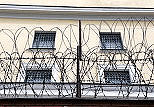May 6 Detainees Face Dangerous Waiting Game

(Moscow Times – themoscowtimes.com – Jonathan Earle and Yekaterina Kravtsova – November 6, 2012)
Six months have passed since bloody clashes between protesters and riot police at an opposition rally on the eve of President Vladimir Putin’s inauguration appeared to mark the end of the street protest movement’s halcyon days.
Subsequent months saw laws on public speech and assembly tightened and criminal investigations opened against two opposition leaders, while another was ousted from the State Duma.
But perhaps nothing has symbolized the Kremlin’s newfound intolerance for critics better than the plodding prosecution of 19 people suspected of participating in violence at the May rally.
It’s anyone’s guess when the 16 suspects awaiting trial two others have had preliminary hearings, and one is still at large will go before a judge. Estimates range from next week to next year.
The pace of the investigation has raised concerns about the effect that extended pretrial detention is having on suspects’ health and fueled suspicion that investigators are writing history rather than uncovering it.
“Investigators will use this time to make something up,” Tatyana Barabanova, mother of suspect Andrei Barabanov, 22, said by telephone Monday.
Barabanov’s lawyer, Svetlana Sidorkina, said that she expected the investigation into her client to wrap up in the next two or three weeks but that the case wouldn’t go to court until next year because it would take several months for lawyers to examine the estimated 18,000 pages of court documents.
Other theories about the sluggish tempo abound. Lawyer Vasily Kushnir said investigators are eager to produce evidence of a grand conspiracy involving financiers, organizers and activists.
“It’s my understanding that they’re trying to implicate Leonid Razvozzhayev and Konstantin Lebedev as organizers and tie them all together ‘here are the organizers; here are the agents,'” said Kushnir, whose client, Stepan Zimin, was detained in early June.
Razvozzhayev and Lebedev, leaders of the Left Front movement, are under investigation for allegedly planning riots to be financed by a Georgian politician, allegations that appeared in “Anatomy of a Protest 2,” a documentary-style film shown on state-controlled television last month.
Investigators successfully argued that Zimin was likely to go into hiding and could influence victims and witnesses, and his detention was extended to March 6. Suspects can legally be held in pretrial detention for up to a year.
“In any country, attacking a law enforcement officer is a serious offense. This is why their detention has been relatively harsh,” said Alexei Mukhin, an analyst for the Center for Political Information. “Political prisoners are imprisoned for their ideas, not for their actions.”
Reports of death and suffering in pretrial detention in recent years have cast a pall over the system, and some May 6 suspects appeared to be faring better than others.
Barabanov’s conditions in pretrial detention are mostly satisfactory, Sidorkina said. He subsists on a diet of mostly oatmeal his petition to be served only vegetarian food has not yet been approved and he’s allowed to meet with relatives once per month, she said, adding that “he doesn’t feel alone.”
But suspect Vladimir Akimenkov, 25, suffers from a severe eye disease and began to lose his vision in pretrial detention. By September, he was nearly blind, according to a brief profile on the website of the May 6 Committee, which organizes rallies and donations on the suspects’ behalf.
“The hospital doesn’t treat him,” May 6 Committee activist Alexander Ivanov said by phone Monday. “Members of the Public Monitoring Commission said after a recent visit that the window in his room was broken and that he can’t use his money account to buy food or anything else. They also said deliveries don’t reach him.”
Akimenkov, Barabanov and others recently had their detention extended to March 6. Supporters have staged several rallies in Moscow and other cities.
Last week, about 800 protesters on New Pushkin Square in Moscow adopted a resolution that called for the release of “all the wrongfully imprisoned” and people in pretrial detention as well as for the resignation of Investigative Committee chief Alexander Bastrykin.
Further protests are scheduled for December, and a fundraising drive to support the suspects is ongoing, Ivanov said.
“I don’t know how I could go through this if the May 6 Committee weren’t helping me,” said Ksenia Kosenko, sister of suspect Mikhail Kosenko. “They gave Mikhail one of his lawyers as well as material and moral support.”
Investigators have chosen to first try Kosenko and Maxim Luzyanin, who has confessed, to establish facts that can be used in later cases, said Vadim Kobzev, a former investigator and now a lawyer, whose clients include Alexei Navalny.
About 400 people were detained during and immediately following the May 6 melee. Rally organizers say police provoked a confrontation by creating a bottleneck, and some have speculated that the violence originated with hired provocateurs.
Several opposition leaders, including Sergei Udaltsov and Navalny, were repeatedly questioned and saw their apartments and offices searched as part of the investigation.
